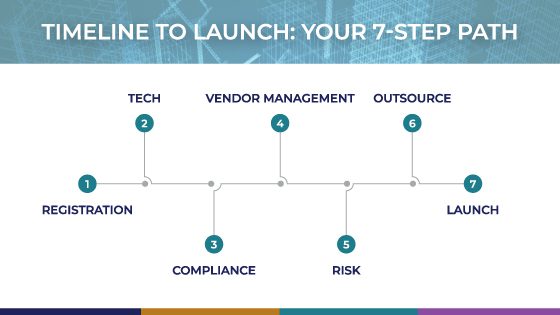Starting a Wealth Management Firm: Steps for Success
Subscribe to our original industry insights
If you’re ready to break away and build your own firm, now is the time. Whether you’re pursuing broker-dealer formation or new RIA registration, starting a wealth management firm offers the freedom to design a business model that aligns with your goals, values, and clients’ needs.
But launching a firm—particularly one that is required to register with the Securities and Exchange Commission (SEC) or Financial Industry Regulatory Authority (FINRA)—involves a multi-step application process, complex compliance requirements, and strategic decisions that can shape your growth trajectory from day one.
At Oyster Consulting, we help startup firms across the United States navigate the registration, regulatory compliance, and operational demands of launching an RIA or broker-dealer. Whether you’re registering with the SEC or seeking FINRA registration, this guide outlines the key steps to start strong.

Define Your Business Model and Services
Before diving into paperwork, it’s critical to define your business model. What business activities will your firm offer? Are you providing financial planning and discretionary management under an RIA firm, or conducting transactions and selling products through a broker-dealer?
Determining whether to register as an investment adviser firm, broker-dealer, or both will influence the entire structure of your firm, including technology, staffing, revenue model, and regulatory obligations.
Firms that misalign their model with their services often face challenges during the registration process, or worse, during future regulatory exams. At this early stage, consider how you plan to supervise registered representatives, manage client relationships, and deliver services.
Understand the Regulatory Landscape
Each firm structure comes with a unique set of rules and regulations. RIAs typically register with the SEC if they manage over $100 million in assets, or with state regulators for smaller firms. Your firm will need to file Form ADV Part 1 and Part 2, which disclose your business activities, compensation structure, conflicts of interest, and more.
Broker-dealers, on the other hand, must undergo FINRA registration via the complex New Member Application (NMA) process, which includes detailed supervisory procedures, financial projections, and evidence of a full compliance program.
Firms must also determine whether additional SROs (self-regulatory organizations) or state filings apply. The Securities and Exchange Commission will expect you to demonstrate your ability to ensure compliance with fiduciary standards, recordkeeping rules, and operational readiness before approval.
Build Your Compliance Program Early
A common mistake among new firms is treating compliance as something to “set up later.” However, both FINRA and the SEC require a documented compliance program in place as part of your registration process.
This includes:
- Policies and procedures or Written Supervisory Procedures (WSPs)
- A compliance calendar
- A Code of Ethics (RIAs)
- Designation of a Chief Compliance Officer (CCO)
- Designation of Finance and Operations Principal (FINOP) and Supervisory Principals (Broker-Dealers)
- Internal control systems for monitoring, surveillance, and testing
During the registration review, regulators will evaluate whether your firm can identify and manage risk. That’s why startup compliance must be approached proactively—not reactively. Oyster often supports new firms by developing custom compliance manuals, onboarding protocols, and ongoing compliance testing schedules.
Complete the Application Process Accurately
For RIAs, registering with the SEC or the appropriate state regulator involves submitting the Form ADV, along with other key disclosures. You’ll also need to prepare privacy notices, cybersecurity policies, and client agreements that match what’s disclosed in your ADV.
For broker-dealers, FINRA registration requires:
- Submission of the New Member Application
- Detailed ownership disclosures (Form U4 for registered individuals)
- Business continuity and AML programs
- Proof of access to clearing arrangements
- Demonstrated supervision of registered representatives
Regulators expect firms to provide complete, accurate, and defensible information. Errors or omissions can delay approval and signal a lack of preparedness. Oyster’s registration consultants help firms prepare materials, respond to regulator inquiries, and avoid common pitfalls during the application review.
Get Help Navigating the Complexity
Launching your own firm is one of the most empowering decisions you can make as a financial professional—but it’s also one of the most regulated. With overlapping rules from FINRA, the SEC, state agencies and other bodies, it’s easy to overlook important steps if you’re navigating the process alone.
Engaging experienced consultants can reduce your time to market, ensure full regulatory readiness, and give you peace of mind. Oyster’s startup team has helped hundreds of firms achieve SEC registration, complete FINRA applications, and launch with a fully operational compliance program.
We don’t just help you get registered—we help you build a firm that’s ready to grow.
Next Steps
Whether you’re exploring new RIA registration, launching a broker-dealer, or forming a dual registrant, the right guidance can make the process smoother, faster, and more strategic. Contact Oyster Consulting to speak with a regulatory expert about your launch plans.





